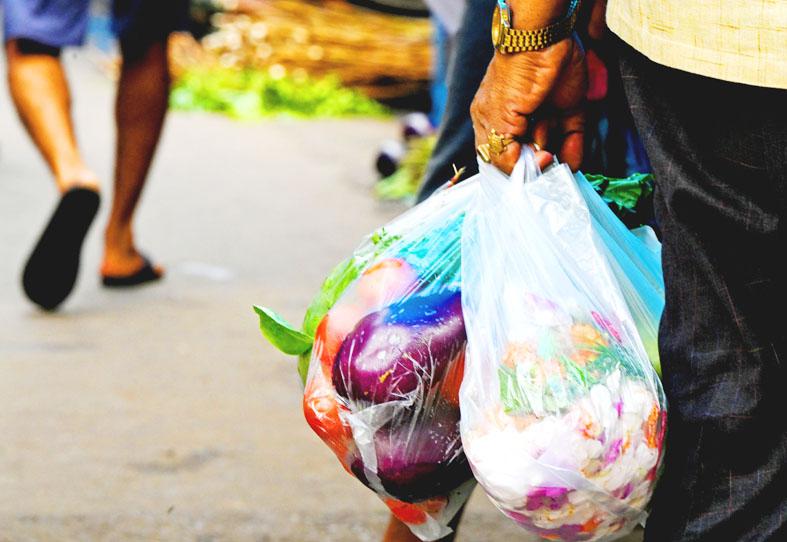India from yesterday banned some single-use or disposable plastic products as part of a federal plan to phase out the material in the nation of nearly 1.4 billion people.
For the first stage, it has identified 19 plastic items that are not very useful, but have a high potential to become litter, making it illegal to produce, import, stock, distribute or sell them.
The items range from plastic cups and straws to ice cream sticks.

Photo: AFP
Some disposable plastic bags would also be phased out and replaced with thicker ones.
Thousands of other plastic products — such as bottles for water or soda or bags for snacks — are not covered by the ban.
However, the federal government has set targets for manufacturers to be responsible for recycling or disposing of them after their use.
Plastic manufacturers had appealed to the government to delay the ban, citing inflation and potential job losses.
However, Indian Minister of Labor and Employment, Environment, Forest and Climate Change Bhupender Yadav told a news briefing in New Delhi that the ban had been in the pipeline for a year.
“Now that time is up,” Yadav said.
This is not the first time that India has considered a plastics ban, but previous iterations have focused on specific regions, resulting in varying degrees of success.
A nationwide ban that includes not just the use of plastic, but also its production or importation was a “definite boost,” said Satyarupa Shekhar, Asia-Pacific coordinator of advocacy group Break Free from Plastic.
In 2020, more than 4.1 million tonnes of plastic waste was generated in India, data from the nation’s federal pollution watchdog said.
The waste management system in the country’s burgeoning cities and villages means that much of the waste is not recycled.
Nearly 13 million tonnes of plastic waste was either littered or not recycled by the South Asian nation in 2019 — the highest in the world, records from Our World in Data showed.
“Given the magnitude of the plastic crisis, this is too little. And it’s too little both in its scope as well as the coverage,” Shekhar said.
Ravi Agarwal, the director of Toxics Link, a New Delhi-based advocacy group that focuses on waste management, said that the ban was “a good beginning,” but its success would depend on how well it is implemented.
Enforcement of the law would be in the hands of individual states and city municipal bodies.
India said that the banned items were identified while keeping in mind the availability of alternatives: bamboo spoons, plantain trays, wooden ice-cream sticks.
However, in the days leading up to the ban, many vendors said that they were confused.
Moti Rahman, 40, is a vegetable vendor in New Delhi. Customers at his cart carefully picked out fresh summer produce on Tuesday before he tipped them into a plastic bag.
Rahman said that he agrees with the ban, but added that if plastic bags are stopped without a readily available and equally cost-effective replacement, his business would be affected.
“After all, plastic is used in everything,” he said.

Yemen’s separatist leader has vowed to keep working for an independent state in the country’s south, in his first social media post since he disappeared earlier this month after his group briefly seized swathes of territory. Aidarous al-Zubaidi’s United Arab Emirates (UAE)-backed Southern Transitional Council (STC) forces last month captured two Yemeni provinces in an offensive that was rolled back by Saudi strikes and Riyadh’s allied forces on the ground. Al-Zubaidi then disappeared after he failed to board a flight to Riyadh for talks earlier this month, with Saudi Arabia accusing him of fleeing to Abu Dhabi, while supporters insisted he was

‘SHOCK TACTIC’: The dismissal of Yang mirrors past cases such as Jang Song-thaek, Kim’s uncle, who was executed after being accused of plotting to overthrow his nephew North Korean leader Kim Jong-un has fired his vice premier, compared him to a goat and railed against “incompetent” officials, state media reported yesterday, in a rare and very public broadside against apparatchiks at the opening of a critical factory. Vice Premier Yang Sung-ho was sacked “on the spot,” the state-run Korean Central News Agency said, in a speech in which Kim attacked “irresponsible, rude and incompetent leading officials.” “Please, comrade vice premier, resign by yourself when you can do it on your own before it is too late,” Kim reportedly said. “He is ineligible for an important duty. Put simply, it was

The Chinese Embassy in Manila yesterday said it has filed a diplomatic protest against a Philippine Coast Guard spokesman over a social media post that included cartoonish images of Chinese President Xi Jinping (習近平). Philippine Coast Guard spokesman Jay Tarriela and an embassy official had been trading barbs since last week over issues concerning the disputed South China Sea. The crucial waterway, which Beijing claims historic rights to despite an international ruling that its assertion has no legal basis, has been the site of repeated clashes between Chinese and Philippine vessels. Tarriela’s Facebook post on Wednesday included a photo of him giving a

Syrian President Ahmed al-Sharaa on Sunday announced a deal with the chief of Kurdish-led forces that includes a ceasefire, after government troops advanced across Kurdish-held areas of the country’s north and east. Syrian Kurdish leader Mazloum Abdi said he had agreed to the deal to avoid a broader war. He made the decision after deadly clashes in the Syrian city of Raqa on Sunday between Kurdish-led forces and local fighters loyal to Damascus, and fighting this month between the Kurds and government forces. The agreement would also see the Kurdish administration and forces integrate into the state after months of stalled negotiations on